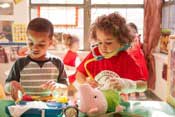Self-regulation is a set of skills that help children and adults manage feelings and behaviors appropriately for a given situation, calm down when upset, adjust to changes, and handle frustration. These skills are complex and develop early. A recent review that examined many studies over several years found that self-regulation skills in preschool were positively associated with children’s social competencies, school engagement, and academic performance (literacy and math) into elementary school. These skills extend beyond children’s school years—this examination of data also found that early self-regulation skills were associated with outcomes well into adulthood, including decreased unemployment rates, reduced criminal behavior, reduced rates of obesity and substance use, and lower levels of depression and anxiety (you can explore the full article here).
Knowing the importance of early self-regulation skills for children’s success across school and life leads us to ask, “how can we encourage development of these skills in the kindergarten classroom?” Self-regulation skills can be supported through academic and social activities with peers and also through children’s interactions and relationship with you, their teacher! Below we provide concrete strategies you can use in your classroom to support students’ self-regulation development.
In the classroom, pretend play is one way to support children’s developing self-regulation skills. Pretend play, especially complex pretending that involves elaborate scenarios and multiple children, is uniquely linked to self-regulation. As children pretend, they are required to hold key information in mind (I’m a pirate! We’re on a boat! My best friend is really my sworn enemy!). They have to inhibit the natural impulse to act like themselves so they can act like their character (I’m a cat now, so I say “Meow!” for “yes” and “Meow-meow” for “no!”). And they often engage in coordination and planning, which draws on complex cognitive skills. A busy school day may not allow much time for pretending, but you can encourage children to pretend during recess or provide props for role-playing on a theme during stations. (Learn more about pretend play here.)

source: kindercare.com
Shared book reading is another great way to promote social-emotional skill development and integrate literacy. Many books geared for kindergarten students provide rich opportunities for social and emotional learning when you emphasize to students how the characters in these stories have feelings just like them, and how they also face challenges with managing their emotions and behavior, getting along with others, and making friends! Using the social and emotional content of stories to generate large- and small-group discussions is a fantastic way to help your students build the vocabulary and strategies they will need in order to understand, manage, and communicate their emotions as well as navigate social situations with peers and adults.
Here are a couple of our favorite books and activities to support self-regulation skills (here and here).

Some other quick strategies you can use in the classroom to help promote self-regulation skill development include:
- Work through some deep belly breathing:
Help students learn the power of breath in calming their body and mind. Breathe in for 2 seconds, hold for 2 seconds, breathe out for 3-4 seconds, repeat.
- Use the Turtle Technique:
Guide students through four calm-down steps alongside “Tucker Turtle.” Materials can be found here. (For a refresher, see Introduction to the Turtle Technique.)
- Progressive muscle relaxation:
Talk students through the tightening and releasing of different body parts one at a time (e.g., clench and release toes, then legs, then thighs, etc.).
What about the student who does not seek your support when frustrated? Some children need extra support to connect. What can you do to help a student connect to you? One effective strategy is Banking Time. Banking Time is an intervention where you spend short regular intervals (10 minutes, 2-3 times a week for 6 weeks) interacting with a student so that you and the child can learn about each other outside of the busy demands of the school day. Research has shown that spending this time with children who struggle to regulate their behavior (i.e., students who are very active and impulsive, become frustrated easily, and are sometimes argumentative) improved their behavior as reported by teachers and parents, and improved the stress students experienced as part of the school day (as measured by the hormone cortisol).

In Banking Time, teachers let the student lead the interactions and use specific techniques such as observing and commenting on the student’s behaviors and feelings. You can learn more about Banking Time in this short summary document and if you think this might be something you want to try, you can download the Banking Time Manual.
When teachers are responsive and sensitive to a child’s needs, it sends the message that their teacher values and respects them, they are safe with their teacher, and they can rely on their teacher when they need help.
Children’s early academic careers include learning to count and read, and research clearly supports that children are able to get the most out of early literacy and math instruction when they have well-developed self-regulation and social skills. Importantly, in kindergarten, young children are still developing these skills which makes the classroom an excellent environment to teach, model, and support social and self-regulation skills. Not only do these skills set the foundation for success in school, they also set the foundation for success in life and well into adulthood.
More questions? VKRP provides support via the online chat feature when you are in the system, via email vkrp@virginia.edu, and via toll free 866-301-8278 ext. 1